新概念英语第一册117课 课件(共17张PPT)
合集下载
免费 New Concept English新概念英语第一册117-118课课件

• Later that morning, When I was doing the housework, my husband phoned me from the office. • later that morning 那天上午晚些时候 • when I was doing the housework… • 是过去进行时态,表示过去正在进行的动作。 • my husband phoned me from the office • 是一般过去时,表示比较短晢的动作或事情。
New Concept English
Lesson 117 Tommy's breakfast
单词学习
• • • • • • dinning room(hall) coin mouth swallow later toilet 饭厅 n. 硬币 n. 嘴 v. 吞下 adv. 后来 n. 厕所,盥洗室
• • • • • • • • • • •
swallow ① v. 吞下,咽下 Tommy swallowed the coins. ② v. 抑制,使不流露 I tried hard to swallow my doubts. 我强忍着不露出怀疑的神色。 她忍住没笑,静静地坐在那里。 She swallowed a smile and sat there still. ③ v. 吞并;侵吞 我们公司去年被一家美国公司吞并了。 Our company was swallowed up by an American company last year. • Nazi Germany nearly swallowed up the whole Europe in World War II. • 第二次世界大战中,纳粹德国几乎吞并了整个欧洲。
Lesson117(课件)新概念英语第一册
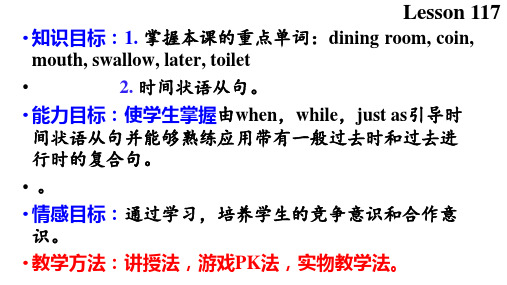
翻译下列句子。 • 1. 当我到达时,她正在做饭。 • When I __a_r_ri_v_e_d_, she_w_a_s___ _c_o_o_k_in_g_ a meal. • 4. 当我读书时,我妈妈正在做饭。 • _W__h_i_le____I was reading , • my mother __w_a_s_____ __c_o_o_k_i_n_g_____.
• A. him B. his
C. himself D. it
• (A) 4. Have you ever _______ Shenzhen?
• A. been to B. gone to C. went to
D. gone in
• (C ) 1. When he _______ I _______ a bath.
do housework
phone me from the office
一、选择题
• (C) 1. I _______ my pen everywhere but I couldn’t _______ it.
• A. looked for, found
B. found, looked for
• C. looked for, find
•。
• 情感目标:通过学习,培养学生的竞争意识实物教学法。
翻译下列句子。 • 1. 当我到达时,她正在做饭。 • When I ________, she______ _______ a meal. • 2. 当我读书时,我妈妈正在做饭。 • _________I was reading , • my mother _________ _____________.
While ... have breakfast, Tommy, find two small coins
新概念英语第一册117课课件45358教学教材
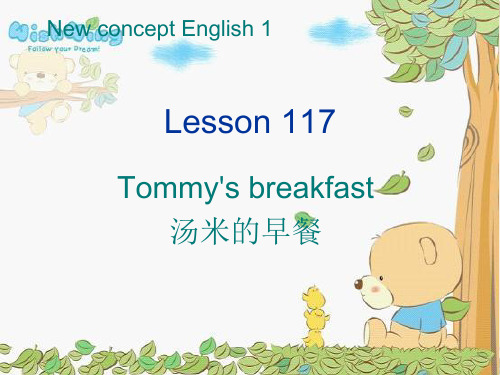
在分词
Theyห้องสมุดไป่ตู้were not watching TV. 3、疑问句:was/were + 主语+ 现在
分词
Was he writing a letter last night?
❖ 常用时间状语
When, while, a moment ago, from nine to ten last evening, at that time ❖ when既指时间点,也可指一段时间, while只指 一段时间,因此when引导的时间状语从句中 的动词可以是终止性动词,也可以是延续性动 词,而while从句中的动词必须是延续性动词。
o’clock last night.
Practice Time!
1. While she ___ TV, Penny ___ asleep.
A. watches, was falling B. was watching, fell C.was watching, was falling D. watch, fell KEY: B
7. Mike and I___(play) basketball at that time yesterday afternoon.
课文讲解
❖ When my husband was going into the dining room this morning, he dropped some coins on the floor.
❖ There were coins everywhere. We looked for them, but we could not find them all.
❖ everywhere 到处 ❖ look for 寻找(强调动作和过程) ❖ find 找到 (强调寻找的结果) ❖ 我找遍了任何地方都找不到我的钢笔。
Theyห้องสมุดไป่ตู้were not watching TV. 3、疑问句:was/were + 主语+ 现在
分词
Was he writing a letter last night?
❖ 常用时间状语
When, while, a moment ago, from nine to ten last evening, at that time ❖ when既指时间点,也可指一段时间, while只指 一段时间,因此when引导的时间状语从句中 的动词可以是终止性动词,也可以是延续性动 词,而while从句中的动词必须是延续性动词。
o’clock last night.
Practice Time!
1. While she ___ TV, Penny ___ asleep.
A. watches, was falling B. was watching, fell C.was watching, was falling D. watch, fell KEY: B
7. Mike and I___(play) basketball at that time yesterday afternoon.
课文讲解
❖ When my husband was going into the dining room this morning, he dropped some coins on the floor.
❖ There were coins everywhere. We looked for them, but we could not find them all.
❖ everywhere 到处 ❖ look for 寻找(强调动作和过程) ❖ find 找到 (强调寻找的结果) ❖ 我找遍了任何地方都找不到我的钢笔。
新概念英语第一册117课课件(共47张PPT)

Lesson 117
Tommy's breakfast
汤米的早餐
New words
dinning room ['dainiŋ'ru:m] 饭厅
coin [kɔɪn]来自n.硬币mouth [maʊθ]
n.嘴
swallow ['swɔləu] v.吞下
later ['leɪtə] adv.后来
toilet ['tɒɪlɪt] n. 厕所,盥洗室
twice three times four times 9. while 10. when
7.去过某地 8. 一次
二次 三次 四次 9. 正当…时 10.什么时候/何时/ 当…时
Phrases
1. 走进… 2. 走出… 3.寻找(强调找的动作过程)
找到(强调找的结果) 4.把…放入…里 5.(两者)都
There were coins everywhere. We looked for them, but we could not find them all.
Language points
2. there were coins everywhere.
复合不定代词
Every
No
Any
Some
One Thing Body
Everyone No one Everything Nothing Everybody Nobody
Anyone Someone Anything Something Anybody somebody
We looked for them, but could not find them all.
主句为一般过去时表示比较短晢的动作或事情
Tommy's breakfast
汤米的早餐
New words
dinning room ['dainiŋ'ru:m] 饭厅
coin [kɔɪn]来自n.硬币mouth [maʊθ]
n.嘴
swallow ['swɔləu] v.吞下
later ['leɪtə] adv.后来
toilet ['tɒɪlɪt] n. 厕所,盥洗室
twice three times four times 9. while 10. when
7.去过某地 8. 一次
二次 三次 四次 9. 正当…时 10.什么时候/何时/ 当…时
Phrases
1. 走进… 2. 走出… 3.寻找(强调找的动作过程)
找到(强调找的结果) 4.把…放入…里 5.(两者)都
There were coins everywhere. We looked for them, but we could not find them all.
Language points
2. there were coins everywhere.
复合不定代词
Every
No
Any
Some
One Thing Body
Everyone No one Everything Nothing Everybody Nobody
Anyone Someone Anything Something Anybody somebody
We looked for them, but could not find them all.
主句为一般过去时表示比较短晢的动作或事情
新概念一Lesson117 Tommy27s breakfast PPT
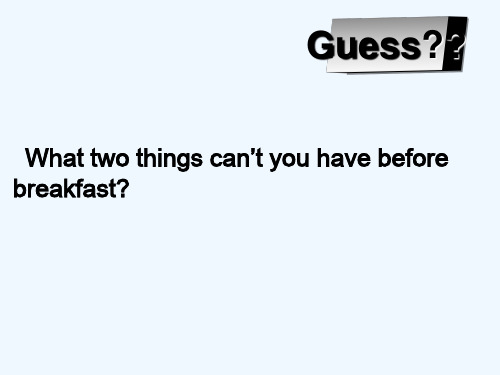
An Italian breakfast
• An Italian likes to eat on the run with a cappuccino and croissant.
The famous American breakfast
• - home made thick pancakes with syrup, blueberries and bacon.
① 过去进行时态, 在某事发生的同时,发生了某事。 ② when 和while 的区别
4, He put them both into his mouth. ① put sth. + 介词 把……放在 ② both 两个 all 三个或三个以上
5, We both tried to get the coins, but it was too late. Tommy had already swallowed them.
-What were the twins drawing when the teacher came in? -They were drawing a car.
2. They ___w_e_r_e__b_u_y__in_g__c_l_o_t_h_e_s_ (在买衣服)
when the UFO arrived.
at the table
on the basketball ground
Were they…?
Was he….?
Was she….?
The Past Continuous Tense (过去进行时)
基本结构:
Sb+
was were
/ /
wasn’t weren’t
+ doing
新概念英语第一册117-118课课件

swallow n.吞下
6
第六页,共30页。
toilet n.盥洗室
7
第七页,共30页。
单词(dāncí)学习
• dinning room(hall)
饭厅
• c oi n
n. 硬币
• m ou th
n. 嘴
• s w a ll ow
v. 吞下
• l a t er
adv. 后来
• t oi l e t
find it. • all是them的同位语 • them all = all of them
18
第十八页,共30页。
• While we were having breakfast, our little boy, Tommy, found two small coins on the floor.
year. • Nazi Germany nearly swallowed up the whole Europe in World
War II. • 第二次世界大战中,纳粹德国几乎吞并了整个欧洲。
15
第十五页,共30页。
• later • 1) adv. 后来,较迟地,较后地 • 回头见 • see you later. • 三天后 • three days later • 他比平常(píngcháng)来得晚。 • He came later than usual. • 2〕adj. 较迟的,较后的,更近的。 • 我们搭晚一点的火车吧。 • Let’s take a later train.
17
第十七页,共30页。
• There were coins everywhere. We looked for them, but we could not find them all.
新概念英语第一册117课课件
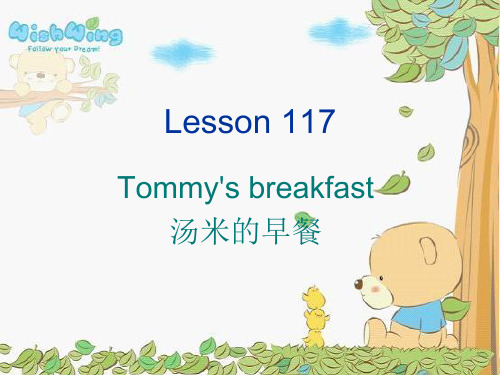
常用时间状语 When, while, a moment ago, from nine to ten last evening, at that time
when既指时间点,也可指一段时间, while只指 一段时间,因此when引导的时间状语从句中 的动词可以是终止性动词,也可以是延续性动 词,而while从句中的动词必须是延续性动词。
He
put them both into his mouth. We both tried to get the coins. But it was too late. Tommy had already swallowed them! put sth +介词短语 把…东西放在… 把书放在桌子上 Put the books on the desk. both表示“两个都…” 他们俩都想去法国。 They both want to go to France. 三者或三者以上用all 他们大家都幸福 They were all happy.
Lesson 117
Tommy's breakfast 汤米的早餐
Dining room(hall) 饭厅
Living room
起居室,客厅
Bedroom
卧室
Bathroom
洗浴室,卫生间
Kitchen
厨房
n. 硬币(可数名词) e.g. Every coin has two sides. 每个事物都有两面性。 mouth n. 嘴 e.g. Don‟t talk with your mouth full!
later
1) adv. 后来,较迟地,较后地 e.g. three days later 三天后 e.g. He came later than usual. 他比平常来得晚。 2)adj. 较迟的,较后的,更近的。 e.g. Let‟s take a later train. 我们搭晚一点的火车吧。 drop v. (意外)掉落;使掉落 e.g. A drop in the bucket/ocean.
新概念英语第一册 117课ppt
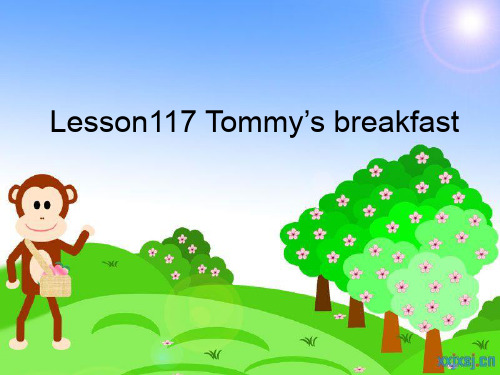
过去进行时
过去进行时表示过去某一时刻正在发生的动 作。与一般过去时相比,它强调动作的正 在进行,而一般过去时强调动作本身或者 动作的结果。 构成: 主语+was/were+v-ing 如果过去的两个动作同时发生,我们可以用 when /while连接这两个同时发生的动作。 译作“正当…的时候”.
Listen and answer What does she mean by “change”in the last sentence?
It’s your turn!
What is he doing now? Vae is singing now! What was he doing at the concert? Vae was singing at the concert!
What was Carfiled doing at 11 O’clock yesterday morning?
Carfiled was cooking at 11 O’clock yesterday morning.
Joe was reading a book. Carfield was watching TV.
while When Joe was reading a book,Carfield was watcson117 Tommy’s breakfast
Look at them!
Yesterday evening Messi was kicking football yesterday evening.
at that moment
Maradona was shouting at that moment.
1今天早上当我哥哥走进房间时,把一些硬币掉在地上了。 2正当我们吃饭时,我们的妹妹找到了两枚硬币。 3当我做作业时,奥特曼从窗外飞过去了。
新概念英语第一册117-118课PPT

• 3.leave, arrive, start, die 等用在过去进行时表 示“快要完成,即将…”。而用在一般过去时 当中则表示“己经完成”。 • 火车快要停了。 • The train was stopping. • 火车停了。 • The train stopped.
• ⑴ I saw Lisa in the street yesterday,but she didn’t see me . • She the other way. (2008年,徐州) • A. was looking B.is looking C.looked D.has looked • ⑵—What did the teacher say just now? (2008年,河南) • --Sorry, I didn’t catch it.I something else. • A.think B.will think • C.was thinking D.had thought • ⑶I___my homework while my parents____TV last night. (2006年,南 京) • A.did;have watched B.was doing;were watching • C.had done;were watching D.would do;were watching • ⑷—Did you see the traffic accident yesterday? (2005年,苏州) • --Yes.It happened when I_______past the museum. • A.walk B.am walking C.will walk D.was walking
coin /kɔin/ n. 硬币 a silver coin 银币 你能把这个一美元的纸币换成硬币吗? Could you change the one-pound note into coin? mouth /mauθ/ n. 嘴 Open your mouth.
新概念英语第一册117-118课PPT

• 基本用法 • 1.表示过去某一时间正进行的动作。
• 这一特定的过去时间通常用时间状语,时间状 语从句或由上下文来表示。 • 今晨七点钟的时候他们正在刮胡子。 • They were shaving at seven this morning. • 当我进来时,她在给一个朋友打电话。 • பைடு நூலகம்he was telephoning a friend when I came in.
• 同位语 • 一个名词(或其它形式)对另一个名词或代词 进行修饰,限定或说明,这个名词(或其 它形式)就是同位语。同位语与被它限定 的词的格要一致,并常常紧挨在一起。
2014-1-7
• While we were having breakfast, our little boy, Tommy, found two small coins on the floor. • while“当…时”,过去进行时的时间状语从句 一般由when, while及as等引导,说明主句中动 作发生的情景。 • 当她正在打扫房间的时候,她的丈夫给她打了 电话。 • While she was cleaning the room, her husband telephoned her. • 当孩子正在花园玩的时候,开始下雨了。 • As the children were playing in the garden, it began to rain.
• 2. 过去进行时可以表示过去反复做的动作,而 一般过去时表示具体的某一次行为动作。 • 青蛙跳上跳下 • The frog jumped up and down. • 青蛙不停的跳上跳下。 • The frog was jumping up and down. • 他点了点头。 • He nodded. • 他不停地点头。 • He was nodding.
新概念一册lesson117-118(课堂PPT)
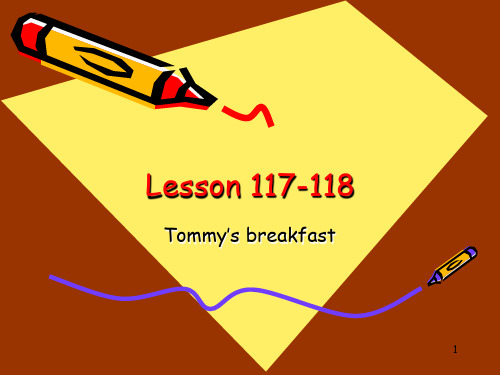
14
• He came downstairs. I had breakfast • He came downstairs when I was
having breakfast.
15
• The train left. I bought the tickets. • The train left when I was buying the
20
She was phoning while he was shaving.
21
• When my husband was going into the dining room this morning, he dropped some coins on the floor.
22
寻找
• There were coins everywhere. We looked for them, but we could not find them all.
找到
23
• While we were having breakfast, our little boy, Tommy, found two small coins on the floor.
24
• He put them both into his mouth. We both tried to get the coins, but it was too late. Tommy had already swallowed them!
25
• Later that morning, when I was doing the housework, my husband phoned me from the office.
26
• He came downstairs. I had breakfast • He came downstairs when I was
having breakfast.
15
• The train left. I bought the tickets. • The train left when I was buying the
20
She was phoning while he was shaving.
21
• When my husband was going into the dining room this morning, he dropped some coins on the floor.
22
寻找
• There were coins everywhere. We looked for them, but we could not find them all.
找到
23
• While we were having breakfast, our little boy, Tommy, found two small coins on the floor.
24
• He put them both into his mouth. We both tried to get the coins, but it was too late. Tommy had already swallowed them!
25
• Later that morning, when I was doing the housework, my husband phoned me from the office.
26
新概念英语第一册第117-118课件

n. 嘴
Open your mouth.
张开(zhānɡ kāi)你的嘴。
Shut your mouth.
闭嘴〔口〕
face, eyebrows, eye, nose, ear, mouth
from hand to mouth 勉强糊口
from mouth to mouth 口口相传的
have a big mouth
arrived. v 当他刮胡子的时候,他伤到他自己了。 v He cut himself while he was shaving. v 当我妻子在做饭的时候,我在花园里工作。 v My wife was cooking the dinner while I was
working in the garden.
第十一页,共36页。
Key words and expressions
• 三天后 • 回头见,再见 • 早晚,总有一天 • 他比平常(píngcháng)
来得晚
• three days later • see you later • sooner or later • He came later than
Pay a person back in his own coin. 以其人之道还治其人之身。 你能把这个一美元的纸币换成硬币吗?
Could you change the one-dollar note into coins?
第九页,共36页。
Key words and expressions
★ mouth
v
v 这个箱子太重,我搬不动。 v The box is too heavy for me to carry.
第十五页,共36页。
新概念英语第一册第117课完整ppt课件

精选ppt
阅读课文回答问题
What does the she mean by ‘change’ in the last sentence ?
精选ppt
再看一遍课文
精选ppt
When my husband was going into the dining room this morning
精选ppt
续的或同时发生的,那么主从句的动词都可用过去
进行时。
精选ppt
本课语法过去进行时
1.过去进行时由“主语+was/were+动词ing”构成 2.过去进行时的否定式由“主语+was/werenot+现 在分词”构成 3.过去进行时的疑问式由“was/were+主语+现在 分词”组成 句型 肯定句=主语+was/were+doing+其它 否定句=主语+was/were+not+doing+其它 一般疑问句问语=Was/Were+主语+doing+其它 答语:Yes,Iwas/were.或No,Iwasn't/were’t. 特殊疑问句=特殊疑问词精+选p一pt 般疑问句+其它
精选ppt
本课语法
1.look for,寻找(强调动作过程);find,找到(强调寻找的结 果)。 2.Tommy had already swallowed them! 汤米已经把硬币咽了下去 句中用了过去完成时形式 had swallowed。过去完成时用来表示过去 两个动作中发生在前的那个动作。显然,句中咽下硬币的动作发生在 夫妇俩能够把硬币从汤米手中抢过来之前。 3.later that morning,那天上午的晚些时候。 later是副词late的比较级。 4.any change change是个多义词,既有“零钱”的意思,也有“变化”的意思。此 处既可指“硬币”;也可指“情况的变化”。这是双关(pun /p)n/) 修辞法。
阅读课文回答问题
What does the she mean by ‘change’ in the last sentence ?
精选ppt
再看一遍课文
精选ppt
When my husband was going into the dining room this morning
精选ppt
续的或同时发生的,那么主从句的动词都可用过去
进行时。
精选ppt
本课语法过去进行时
1.过去进行时由“主语+was/were+动词ing”构成 2.过去进行时的否定式由“主语+was/werenot+现 在分词”构成 3.过去进行时的疑问式由“was/were+主语+现在 分词”组成 句型 肯定句=主语+was/were+doing+其它 否定句=主语+was/were+not+doing+其它 一般疑问句问语=Was/Were+主语+doing+其它 答语:Yes,Iwas/were.或No,Iwasn't/were’t. 特殊疑问句=特殊疑问词精+选p一pt 般疑问句+其它
精选ppt
本课语法
1.look for,寻找(强调动作过程);find,找到(强调寻找的结 果)。 2.Tommy had already swallowed them! 汤米已经把硬币咽了下去 句中用了过去完成时形式 had swallowed。过去完成时用来表示过去 两个动作中发生在前的那个动作。显然,句中咽下硬币的动作发生在 夫妇俩能够把硬币从汤米手中抢过来之前。 3.later that morning,那天上午的晚些时候。 later是副词late的比较级。 4.any change change是个多义词,既有“零钱”的意思,也有“变化”的意思。此 处既可指“硬币”;也可指“情况的变化”。这是双关(pun /p)n/) 修辞法。
新概念英语第1册_第117-118课.ppt

— Sorry. I didn’t catch it. I __C__ something else. A. think B. will think C. was thinking D. had thought 5. When I came back yesterday evening, my brother ___C_____ his homework.
3. —Why didn’t you answer my telephone yesterday?
—Sorry. I ___D____ a bath. A. took B. take C. am taking D. was taking
4. —What did the teacher say just now?
2.Where were the coins? 3.Could they find them? 4.What did the little boy do while they were having
breakfast? 5.Why it was too late? 6.What was the wife doing when her husband
You can see Great Barrier Reef in this
beautiful country. Every year there’s a lot of people come here to see the wonderful land. This is also a paradise of animals. I believe that you will have a good time here.
telephoned her? 7.How many time has Tommy been to the toilet?
3. —Why didn’t you answer my telephone yesterday?
—Sorry. I ___D____ a bath. A. took B. take C. am taking D. was taking
4. —What did the teacher say just now?
2.Where were the coins? 3.Could they find them? 4.What did the little boy do while they were having
breakfast? 5.Why it was too late? 6.What was the wife doing when her husband
You can see Great Barrier Reef in this
beautiful country. Every year there’s a lot of people come here to see the wonderful land. This is also a paradise of animals. I believe that you will have a good time here.
telephoned her? 7.How many time has Tommy been to the toilet?
相关主题
- 1、下载文档前请自行甄别文档内容的完整性,平台不提供额外的编辑、内容补充、找答案等附加服务。
- 2、"仅部分预览"的文档,不可在线预览部分如存在完整性等问题,可反馈申请退款(可完整预览的文档不适用该条件!)。
- 3、如文档侵犯您的权益,请联系客服反馈,我们会尽快为您处理(人工客服工作时间:9:00-18:30)。
• 4. The boss arrived when she was typing a letter.
• 5. The train left when I was buying the tickets.
• 6. It rained heavily when I was driving to London.
A. is having B. have C. has D. was having
4. What ____ you ____from 7 to 9 yesterday ? A. were, doing B. did. do C. have, done
5.Look! Lily with her sister __ a kite on the playground.
shaving
cut
Exercise P239
• 1. He knocked at the door when I was answering the phone.
• 2. He came downstairs when I was having breakfast.
• 3. The phone rang when I was washing the dishes.
过去进行时VS现在进行时
结构
现在am/is/are+v-ing 过去was/were+v-ing
The students are drawing pictures now.
The students were drawing pictures when the teacher came in.
3.时间状语:
New words and expressions
dining room
coin
/kɔɪn/
mouth /maʊθ/
饭厅 n. 硬币 n. 嘴
swallow /’swɒləʊ/ v. 吞下
later /’leɪtə/ toilet /’tɔɪlɪt/
adv. 后来 n. 厕所,盥洗室
Swallow
间内正在进行的动作.
2.结构 was/ were + v-ing
Jim was sleeping when I came in.
(过去某一时刻)
They were doing their homework from 6:00 to 8:00 yesterday evening . (过去某一时间内)
Later 1. Adv.后来,较迟地
See you later. three days later. Later, the man found his son. 2. Adj.较迟的,较后的 let’s take the later train.
过去进行时
1.定义 表示在过去某一时刻或某一段时
V. 1.吞下,咽下 Do not swallow the coin! 2.吞并,侵吞 My company was swallowed up by an American
company last year. Nazi Germany nearly swallowed up the whole Europe in World War Two. 3.抑制,使不流露 She swallowed a smile an sat there still. n. 燕子
5 minutes later
What is the girl doing ? She is doing exercise.
What was she doing just now. She was doing exercise just now.
What was he doing this time yesterday?
watching
We ____(water) trees while they_____个长时间进行 的动作正在进行,那么动作长时间进行的 句子用进行时态,临时发生的那个动作用 一般过去时态。
e.g. He cut himself while he was shaving
at this time yesterday/last year… at that time, at nine yesterday morning, the whole afternoon, 由 when, while, as 等引导的时间状语从句.
e.g.
What was he doing this time yesterday? At that time they were watching a movie.
A. is flying B. was flying C. are flying
6. --- Hi, Lin Tao, I didn't see you at the party.
--- Oh, I ____ ready for the Math exam.
A. am getting
B. was getting
C. got
D. have got
when和while引导时,主从句时态
1.如果两个长时间发生的动作或行为在过去的 某段时间同时发生,两个句子都用过去进 行时态且用while连接两个句子
e.g. My mother was cooking while my father was watching TV. cooking
2. What ____they ____at eight yesterday
evening?
A. are, doing
B. did, do
C. have, done
D. were, doing
3. You can't see him now because he ____ an important meeting.
What was she doing at that time?
Were they…?
Were they…?
1. What ____ your grandma ____ at this time yesterday?
A. is, doing B. was, doing D. had. Done
• 5. The train left when I was buying the tickets.
• 6. It rained heavily when I was driving to London.
A. is having B. have C. has D. was having
4. What ____ you ____from 7 to 9 yesterday ? A. were, doing B. did. do C. have, done
5.Look! Lily with her sister __ a kite on the playground.
shaving
cut
Exercise P239
• 1. He knocked at the door when I was answering the phone.
• 2. He came downstairs when I was having breakfast.
• 3. The phone rang when I was washing the dishes.
过去进行时VS现在进行时
结构
现在am/is/are+v-ing 过去was/were+v-ing
The students are drawing pictures now.
The students were drawing pictures when the teacher came in.
3.时间状语:
New words and expressions
dining room
coin
/kɔɪn/
mouth /maʊθ/
饭厅 n. 硬币 n. 嘴
swallow /’swɒləʊ/ v. 吞下
later /’leɪtə/ toilet /’tɔɪlɪt/
adv. 后来 n. 厕所,盥洗室
Swallow
间内正在进行的动作.
2.结构 was/ were + v-ing
Jim was sleeping when I came in.
(过去某一时刻)
They were doing their homework from 6:00 to 8:00 yesterday evening . (过去某一时间内)
Later 1. Adv.后来,较迟地
See you later. three days later. Later, the man found his son. 2. Adj.较迟的,较后的 let’s take the later train.
过去进行时
1.定义 表示在过去某一时刻或某一段时
V. 1.吞下,咽下 Do not swallow the coin! 2.吞并,侵吞 My company was swallowed up by an American
company last year. Nazi Germany nearly swallowed up the whole Europe in World War Two. 3.抑制,使不流露 She swallowed a smile an sat there still. n. 燕子
5 minutes later
What is the girl doing ? She is doing exercise.
What was she doing just now. She was doing exercise just now.
What was he doing this time yesterday?
watching
We ____(water) trees while they_____个长时间进行 的动作正在进行,那么动作长时间进行的 句子用进行时态,临时发生的那个动作用 一般过去时态。
e.g. He cut himself while he was shaving
at this time yesterday/last year… at that time, at nine yesterday morning, the whole afternoon, 由 when, while, as 等引导的时间状语从句.
e.g.
What was he doing this time yesterday? At that time they were watching a movie.
A. is flying B. was flying C. are flying
6. --- Hi, Lin Tao, I didn't see you at the party.
--- Oh, I ____ ready for the Math exam.
A. am getting
B. was getting
C. got
D. have got
when和while引导时,主从句时态
1.如果两个长时间发生的动作或行为在过去的 某段时间同时发生,两个句子都用过去进 行时态且用while连接两个句子
e.g. My mother was cooking while my father was watching TV. cooking
2. What ____they ____at eight yesterday
evening?
A. are, doing
B. did, do
C. have, done
D. were, doing
3. You can't see him now because he ____ an important meeting.
What was she doing at that time?
Were they…?
Were they…?
1. What ____ your grandma ____ at this time yesterday?
A. is, doing B. was, doing D. had. Done
